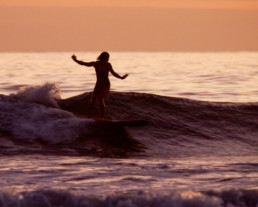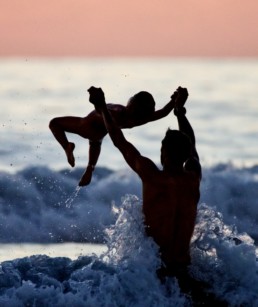The changing circumstances of a dynamic, shifting environment of moving water and gathering or diminishing light… these periods of peak change are always an exercise in healing my frayed American relationship to time. Time is, after all, both the one material on which all my other endeavors, hopes, wishes, and lessons depend for their existence and the medium in which they are rendered.
A few nights ago, I walked the short jungle path from my shack in Playa Guiones, Costa Rica to photograph in the day’s last light on the crescent shaped, white sand beach. As the scene grew redder by the passing minute and sinking sun, I watched a boy, dangling in the air facing the incoming breakers, held up by his strong young father’s hands. As each line of whitewater reached them the man swung the child into the wave in a dense cascade of spray, kicking, and laughter.
Last night, during a different sunset shoot, I saw two young girls scramble up a 5-foot rock wall from a clear tide pool. Atop what must have felt to them like a precipice, they reached for each other’s hands, then jumped. Crescendos of laughter lent cadence and rhythm to both their fall and landing. They plopped down and dug into the sand to scoop wet hands full. Flinging sprays and globs of sandy muck onto the rock wall and each other before bouncing up, they commenced a new cycle of climbing, jumping, flinging, laughing.
This morning, during sunrise, I rode faster, steeper waves than I would have dared when I first arrived here in Costa Rica a couple of months ago. Working hard to choose fun over fear, I paddled over the edge of one particularly large wave and, as I felt my feet find the board, I heard a hoot of encouragement from a young, male Costa Rican surf instructor. When kind of exchange happens I often feel a comforting happiness swelling the thrill of the ride from a deep, primal place, as though I’ve achieved some kind of tribal inclusion. Although unaware of the passing minutes, I spend a lot of time smiling out in the sun and have a world class wrinkle tan to prove it. I have surfed every day my energy allowed and for every second I dared to. No one had to suggest it was a good idea, nor did it take any will-power. I do wear a watch, a chronometer, to keep myself accountable to physical limits adrenaline and just so much fun might tempt me to ignore.
It is easy to be “disciplined” about “exercise” and put up with the adversity in the line-up (the occasional pummeling by whitewater, the risk of a crowd with many beginners, the exhausting nature of the endeavor) when there is the hovering promise— but never a guarantee— of sheer, unadulterated joy. As a matter of fact, the difficulties and occasional fright I feel surfing lend dimension to the bliss and turn it into a sacred, instructive kind of play. Perhaps the same is true for the swinging toddler and the jumping young girls? One thing’s for sure, none of us is counting the minutes.
The changing circumstances of a dynamic, shifting environment of moving water and gathering or diminishing light as the sun crests the mountains or sinks into the sea— these periods of peak change are always an exercise in healing my frayed American relationship to time. Time is, after all, both the one material on which all my other endeavors, hopes, wishes, and lessons depend for their existence and the medium in which they are rendered.

Looking around at the people on this beach, each in their way being playful, it seems we can feel time in our own bodies. We can know the reality of ephemeral happenings lived as we evolved to live them, immersed and fascinated by the world we inhabit and our unlikely existence as its sentient manifestations.
Sunsets and rises are a part of the day when the unidirectional arrow of time feels particularly speedy. Looking around on the beach with waxing or waning light, the planetary movement that gives our days their time renders each elapsing moment of life visible. Somehow this acute awareness of life-time passing never feels stressful and is often inspiring. I wonder if this is true because, at that beautiful hour, the lived experience between blindingly bright and blindingly dark is fleeting and so packed with visible change? It’s a kind of vision that allows us to lose track of the chronological minutes and feel time in the form of moving bodies of sun and earth, light and shadow, deepening or diminishing darkness. Looking around at the people on this beach, each in their way being playful, it seems we can feel time in our own bodies. We can know the reality of ephemeral happenings lived as we evolved to live them, immersed and fascinated by the world we inhabit and our unlikely existence as its sentient manifestations.
Something I’ve learned from watching the people I’ve guided into similarly playful, awe inspiring, sometimes challenging experiences is this: so often they lose track of what we usually think of as time. They emerge into some other deeper awareness of life’s steady, simultaneously cumulative and erasing movement. Each experience takes its rightful place as both a new moment lived and a time forever passed. It’s a way of sensing the contradictory nuance of how brief and full our life time is, or can be, if we cultivate our capacity to show up for it. We love economic metaphors so perhaps we could become more full, authentic participants in our time if we move from spending time to paying attention. This kind of attentive, body-grounded presence and the time perception it allows is a passage, like in music or literature, that moves you towards a concentrated capacity to sense life and the light that illuminates it. Then it becomes a passage, like a journey to another realm of feeling and, with practice, of knowing. I find this sort of ontological clarity and orientation, a creaturely comfort in physically being in one’s time, is most often within easy reach on the beaches I gravitate towards to play and work during these transitions into and out of the well-lighted world my diurnal eyeballs evolved to navigate.
And, at least here in Playa Guiones, I’m not alone. Sunsets in this coastal village are community playtime. People come out at this time of day to talk, to splash, meditate, dig, toddle, and crawl. Some of us come to surf or just to watch this display of time’s movement and be inspired and energized by it. At those moments, time is not our enemy.
I’ve come to believe that, if I am, if we are to have a fighting hope of healing our relationship to our own time, we need more words for the it, this stuff of our lives. The Greeks had at least two: chronos and kairos. Chronos is time as we generally think of it— the kind that can be counted and measured— seconds, minutes, hours, days, and years. Kairos is the sort of time we mean when we say the time is opportune or propitious, a moment (extended or fleeting) in which something must necessarily happen for it to happen at all. A deeper, qualitative kind of time, kairos evokes the layered, unknowable sequence of events and circumstances that must come together to make a time “right.”
I’m writing a draft of this post on a floppy, sandy journal balanced on one knee on this Pacific beach where harried foreigners and locals gather together daily to recover from stress, to lose track of chronos, to find their kairos, and to do so through play. In his interview with Krista Tippett, philosopher and poet John O’Donohue said that “philosophically, stress is a perverted relationship to time, so that rather than being a subject of your own time, you have become its target and victim, and time has become routine.” There is a genius to this sometimes achingly beautiful place. In it’s original, Classical Roman use, the word genius was part of a longer phrase, “genius loci,” meaning the protective spirit of a place. So many of us are here to hope Nosara’s genius will help us heal form emotional or physical challenges. Playtime is central to the potential healing, to rediscovery and renewed protection of some forgotten joy and wonder-filled place deep in each of use. We return because we forget and we need to be reminded of how to rehabilitate our sense of time and return home with new perspective. But what do you do if you can’t (or just don’t want to) run off to a tropical beach?
See Playtime Part 2.

